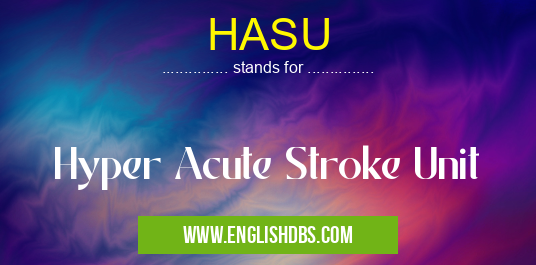What does HASU mean in LABORATORY
HASU stands for Hyper Acute Stroke Unit. It is a specialized medical unit dedicated to providing immediate and comprehensive care to patients who have experienced a stroke. Stroke is a sudden loss of brain function due to a disruption in blood flow to the brain. It is a medical emergency that requires prompt treatment to prevent permanent damage.

HASU meaning in Laboratory in Medical
HASU mostly used in an acronym Laboratory in Category Medical that means Hyper Acute Stroke Unit
Shorthand: HASU,
Full Form: Hyper Acute Stroke Unit
For more information of "Hyper Acute Stroke Unit", see the section below.
» Medical » Laboratory
Introduction: HASU Meaning in Medical
Key Functions of HASU
- Rapid Assessment and Diagnosis: Upon arrival at the hospital, patients suspected of having a stroke are immediately assessed by a team of stroke specialists, including neurologists, nurses, and other healthcare professionals. Advanced imaging tests, such as CT and MRI scans, are performed to confirm the diagnosis and determine the type of stroke.
- Urgent Treatment: Once the diagnosis is confirmed, the HASU team initiates appropriate treatment measures to restore blood flow to the brain and prevent further damage. This may include administering clot-busting medications, performing thrombectomy (a surgical procedure to remove a blood clot), or providing supportive care to stabilize the patient's condition.
- Monitoring and Observation: Patients admitted to the HASU are closely monitored and observed for any signs of improvement or deterioration. The team provides continuous care, including medication administration, vital sign monitoring, and regular neurological assessments.
- Rehabilitation Planning: As the patient's condition stabilizes, the HASU team collaborates with rehabilitation specialists to develop a comprehensive plan for recovery and rehabilitation. This may include physical therapy, occupational therapy, and speech therapy to help patients regain function and return to their previous level of activity.
Essential Questions and Answers on Hyper Acute Stroke Unit in "MEDICAL»LABORATORY"
What is a Hyper Acute Stroke Unit (HASU)?
A HASU is a specialized medical unit that provides immediate and comprehensive care to patients who have experienced an acute stroke. It is designed to rapidly assess, treat, and monitor patients to improve outcomes and minimize the risk of complications.
Why is it important to seek care in a HASU after a stroke?
Strokes are time-sensitive emergencies, and prompt access to specialized care can significantly improve patient outcomes. HASUs are staffed with experts in stroke care who can quickly diagnose the type of stroke, determine the best course of treatment, and initiate life-saving interventions.
What types of treatments are available in a HASU?
HASUs are equipped to provide a range of treatments for stroke, including:
- Thrombolysis (clot-busting drugs)
- Endovascular therapy (mechanical clot removal)
- Brain surgery (in some cases)
- Rehabilitation and supportive care
Who is eligible for admission to a HASU?
Patients who have experienced an acute stroke or are suspected of having one are eligible for admission to a HASU. This includes those with symptoms such as sudden weakness or numbness on one side of the body, speech difficulty, or vision problems.
How long does a patient typically stay in a HASU?
The length of stay in a HASU varies depending on the severity of the stroke and the patient's progress. Typically, patients are admitted for 2-3 days for acute care and monitoring, followed by transfer to a rehabilitation unit or home for ongoing care.
What are the benefits of receiving care in a HASU?
Studies have shown that patients who receive care in HASUs have better outcomes, including:
- Reduced risk of death and disability
- Improved functional recovery
- Shorter hospital stays
Final Words: HASU plays a crucial role in providing timely and specialized care to stroke patients. By offering rapid assessment, urgent treatment, continuous monitoring, and rehabilitation planning, HASU helps improve patient outcomes and minimize the long-term effects of stroke.
HASU also stands for: |
|
| All stands for HASU |
